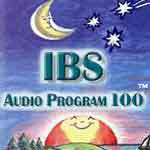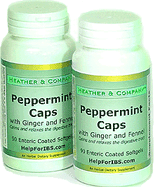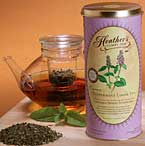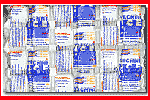| |
 |

Organic Acacia
Soluble Fiber
The prebiotic fiber that reduces bloating & gas!

In this Issue...
Food & Recipes
Rx News & Research
Ask Heather
About Us

Gut-directed hypnosis is one of the most effective ways to help relieve all IBS symptoms! Results can last more than 5 years.


Try Peppermint Caps
Peppermint Caps are the best for abdominal spasms, cramps and pain!

Get the IBS Diet Kit!
With Eating for IBS, plus organic fennel tea for bloating and gas, plus peppermint caps to prevent spasms and pain.
Take control of your IBS!

Get stable now ~
and stay that way!
Did you miss the latest
IBS newsletter and
Roman Pasta Carbonara
recipe?
Past issues
are posted here!


Try Heather's
Peppermint Tummy Tea
Peppermint is a smooth muscle relaxant and has pain-killing properties. Our tea is large leaf with a high volatile oil content - much stronger than tea bags!
 Need help?
Need help?
Have questions?
Come
join the IBS Message Boards!


The IBS Starter Kit!
Learn every way possible to successfully manage your symptoms!
With the First Year: IBS, an essential guide, plus Eating for IBS, plus Acacia Tummy Fiber to start stabilizing immediately!

Heat Therapy for
IBS
Hot packs can help prevent stress-related attacks!
|
 |
|
| |

IF YOUR NEWSLETTER IS HARD TO READ OR IF THE LINKS DON'T WORK,
Please copy and paste this address into your browser window:
http://www.helpforibs.com/news/newsletter/smokytom012804.html
January 28, 2004
This week ~ Ulcerative Colitis Pouchitis & Probiotics
Hello to everyone -
Today's recipe makes a wonderful afternoon pick-me-up on a cold winter day! Sourdough Toasts with Smoky Tomato Jam are a comforting old-fashioned treat given a deliciously different twist with the addition of smoked paprika. While regular sweet paprika will work just fine in this recipe, it's worth seeking out smoked paprika for its incredibly special aroma and flavor. Once you try this mild but truly addictive spice, you'll never want to be without it again. Smoked paprika is available anywhere Spanish or Hispanic foods are sold, at health food market bulk spice departments, and at some grocery stores. If you can't find it anywhere, try using regular sweet paprika and just a drop or two of liquid smoke, which is available at all grocery stores in the condiment or barbecue sauce section (usually hidden on the top shelf).
This recipe is a good example of how adding just a touch of sugar helps cancel the acidity of cooked tomatoes, making them much more tolerable for IBS and GERD as well. The long, slow cooking time of both the tomatoes and onion minimizes their insoluble fiber, as does pureeing the jam after cooking. Serving with sourdough toast provides a good soluble fiber foundation.
As wonderful as this recipe is for a snack or appetizer, I like it even better for brunch with a veggie egg white omelette and hash browns or home fries. You can also use the smoky tomato jam as a topping for broiled skinless chicken breasts or fish, baked potatoes, or melba toast. It makes just about anything you spread it on absolutely delicious!
As always, we have the latest IBS and digestive health news, research, and studies as well, so enjoy.
Best Wishes,
Heather Van Vorous
Note: Did a friend send you this newsletter? Sign up here for your own free subscription.

Sourdough Toasts with Smoky Tomato Jam
Makes 6 servings
1 small onion, finely chopped
1 T extra virgin olive oil
1 (28-32 oz.) can whole tomatoes in juice, drained and finely chopped
1/2 t sweet Spanish smoked paprika
1/2 t sugar
1/8 t salt
1 (20 inch) sourdough baguette, cut diagonally into 1/2 inch thick slices
Cook onion in olive oil in a small saucepan over medium heat, stirring occasionally, for 5 minutes. Reduce heat to low and cook, stirring occasionally, until onion is golden and soft, about 10 minutes more. Add tomatoes, paprika, sugar, and salt. Cook, uncovered, over medium low heat, stirring often, until mixture is thick and jamlike, about 30 minutes. Puree mixture in blender or food processor, then transfer to a bowl.
Preheat oven to 350F. Arrange sourdough toasts in single layer on cookie sheet and bake, turning once, until lightly toasted, about 15 minutes total. Spread toasts with smoky tomato jam and serve.
For hundreds of delicious recipes, come visit the IBS Recipe Exchange Message Board!
Are you just learning how to eat for IBS? A little intimidated at the thought of special IBS recipes? Don't worry! Come see
the IBS Diet pages, and find the answers to all your questions.
 Probiotic Treatment Maintains Remission in Ulcerative Colitis Patients
Probiotic Treatment Maintains Remission in Ulcerative Colitis Patients
Once-daily high-dose probiotic therapy (VSL#3) sustains antibiotic-introduced remission in ulcerative colitis patients with pouchitis, according to a randomized, double-blind study published in the January issue of Gut. "In parallel with clinical, endoscopic, and histological remission, a high level of quality of life was maintained with this therapy," Toshiki Mimura, MD, and colleagues from St. Mark's Hospital in London, U.K., report.
Investigators drew 36 patients with recurrent (occurrence at least twice in the previous year) or refractory (requiring continuous use of antibiotics) pouchitis from St. Mark's Hospital and a center in Bologna, Italy. "This study has demonstrated that in patients with recurrent or refractory pouchitis who have achieved remission with intense antibiotic treatment, the probiotic therapy VSL#3 is highly effective in maintaining remission," write Dr. Mimura and colleagues.
Check here for more
information...
The Effect of Somatization on GI and Extraintestinal Symptoms of IBS
Psychosocial disturbances (eg, depression, anxiety, stressful life events, and somatization) are commonly found in patients with IBS, particularly those with more severe symptoms or those seen in tertiary referral populations. In addition, extraintestinal symptoms, such as fatigue, myalgias, sleep, and sexual disturbances are also frequently reported by patients with IBS. The association between psychosocial factors and extraintestinal symptoms in IBS is not well understood. Future studies that can help establish a biologic marker(s) for IBS would be important in overcoming these challenges.
Check here for more
information...
Surgery and Irritable Bowel Syndrome
An increased number of abdominal surgeries have been reported in a random population of patients with IBS compared with individuals without IBS. Two studies presented recently evaluated the prevalence of surgery in patients with IBS compared with control subjects in 2 different patient populations.
Check here for more
information...
IBS Subgroups by Bowel Habit Predominance
Although there are symptom-based Rome II diagnostic criteria for IBS and for the subgroups of IBS with diarrhea and IBS with constipation, the subgroup criteria are not evidence-based and were developed using expert opinion. Clearly, additional studies need to be performed to more accurately classify patients with IBS into bowel habit subgroups and characterize symptoms in patients with IBS with alternating symptoms (which is lacking in the literature). But first, it should be determined whether subclassifying IBS into these subgroups is even clinically relevant for patient care and research studies, given the fluctuation of IBS symptoms over time.
Check here for more
information...
What Is "Appropriate" Therapy for Intermittent Heartburn?
Whether due to fast food, obesity, and/or loss of protective Helicobacter pylori (the latter is controversial), heartburn seems to be reaching epidemic proportions. High heartburn prevalence has led to substantial use of over-the-counter (OTC) and prescription medications.
Almost by definition, intermittent heartburn is a condition amenable to self-treatment with OTC remedies. It has been argued that heartburn as often as twice weekly could indicate a serious pathological process (thus converting the perception of a mild malady amenable to self-management to a presumably life-threatening disease).
In the absence of documented or suspected reflux complications, the primary treatment aim for heartburn sufferers should be effective symptom relief. With the recent availability of omeprazole as the first OTC proton-pump inhibitor (PPI), there is now a wide range of potential self-treatments working by different mechanisms. This report reviews current concepts of heartburn, self-treatment options, and stepwise management approaches for refractory symptoms.
Check here for more
information...
Calcium + Vitamin D = Lower Colon Cancer Risk
Studies show that dietary calcium helps protect against colorectal cancer, but it appears to need a little help from vitamin D. The new research shows that calcium and vitamin D act synergistically to protect against cancer of the colon. Calcium supplementation did not have much of an effect on the development of precancerous polyps when serum vitamin D levels were low in a study that involved nearly 800 people. And higher vitamin D levels were associated with a reduced risk of colorectal polyps only in people taking calcium.
Check here for more
information...
Meat Fats Worsen, but Fish Oils Help, Heart Disease Risk
Six in 100 Americans carry gene variants that greatly increase their risk of heart disease. But eating the right foods -- and avoiding the wrong ones -- virtually eliminates this risk. The heart-disease gene types -- variant forms of a normal gene -- are more common among blacks, Asians, Pacific Islanders, and other racial or ethnic groups than among Hispanics and non-Hispanic whites. But some people of all races seem to carry the gene variants.
How bad are the gene variants? They pose a greater risk of heart disease -- based on thickening of arteries -- than smoking, and nearly as great a risk as diabetes. A diet high in arachidonic acid -- mostly found in meat fats -- increases the bad effects of the inherited gene forms. But a diet high in fish oils -- such as those found in salmon, tuna, and mackerel -- blunts these effects.
Check here for more
information...
Looking for the latest IBS research and news?
Check out the IBS Research Library!
 Common Pitfalls ~ The Seven Sneaky Deadly Sins of the IBS Diet
Common Pitfalls ~ The Seven Sneaky Deadly Sins of the IBS Diet
"I'm following the Eating for IBS diet, but I still have problems. What am I doing wrong?"
I hear from many people who have made a great effort to modify their diet for IBS, but who still have abdominal symptoms they feel certain are associated with their eating habits. They're often very frustrated because they believe that there aren't any steps left for them to take. The good news here is that it's much more likely than not that there are still dietary triggers involved, they're simply being overlooked.
I've found that there are seven specific pitfalls that ensnare many people as they adjust their diet - let's call them the Seven Sneaky Deadly Sins of the IBS Diet:
1. Coffee (yes, decaf counts)
2. Yogurt (it's the safest dairy product for IBS...isn't it?)
3. Alcohol (just one glass of wine is okay, right?)
4. Vitamin supplements (they're good for you, aren't they?)
5. No insoluble fiber foods (they're triggers, so you just don't eat them, right?)
6. Too low a dosage of soluble fiber supplements
7. Not drinking enough water (doesn't soda pop count?)
Third on the list is...
#3. I've given up most alcohol, but I still like to have a glass of wine or beer when I get home from work. Just one drink can't cause problems, can it?
Alcohol is a strong GI irritant (and a potential colon carcinogen). Just one drink can definitely trigger IBS attacks, especially if you drink on an empty stomach. The worst drinks are those that contain other triggers as well, such as carbonation (beer, champagne), coffee, dairy (pina coladas, creme liqueurs), or fruit juices that are high in fructose. However, even a plain glass of wine or shot of liquor can cause GI problems.
If you're unsure whether or not alcohol in small quantities bothers you, it's best to totally remove it from your diet and get yourself stabilized. At that point you can very carefully try (if you still want to) adding a little alcohol back in to see how it affects you. Your tolerance will likely be greater once you have gotten your gut under control; when that happens your GI tract is less likely to be continually hypersensitive, so there is reason to have hope for the future here.
However...what you definitely don't want to do is assume that just one drink won't hurt you, so you never take the step of completely eliminating all alcohol from your diet. By continuing to drink (especially on a daily basis) you'll simply keep suffering the consequences. This is a very common pattern with the foods and drinks people really don't want to give up - a juicy steak, ice cream sundaes, or that favorite cocktail before dinner. This is just human nature and it's easy to understand, and I definitely sympathize. But, it's always better to know for sure how your body reacts to a potential trigger instead of blindly assuming that something isn't bothering you simply because you don't want it to. IBS doesn't often respond to wishful thinking.
As a general rule, unless you're 100% stable and have no IBS symptoms whatsoever when you drink (either immediately or the following day), it's a safe assumption that alcohol in all forms is likely to cause GI troubles for you. Does this mean that you can never drink any alcohol at all ever again? It might - but it also might not.
How you drink as well as what you drink could make quite a difference here. A single glass of wine enjoyed after a high soluble fiber meal may be very tolerable for you, especially on an occasional (instead of daily) basis. Judging by reader feedback on this topic, white wine may be safer for IBS than red, and beer seems to be particularly problematic. Having a drink when you're feeling relaxed instead of harried can make a difference as well. On the other hand, a double martini on an empty stomach after a stressful day is practically guaranteed to cause trouble.
If you do decide to take a chance with alcohol, please make sure to have at least one glass of water for each alcoholic drink. Alcohol is very dehydrating, and becoming even slightly dehydrated can seriously impact constipation and bloating.
On a happy note, cooking with alcohol is usually very tolerable, as the alcohol evaporates and any carbonation will totally dissipate. You'll be left with all of the flavor but none of the risk!
Coming next...#4 on the list of the Seven Sneaky Deadly Sins of the IBS Diet!
 Heather & Company for IBS, LLC is dedicated to serving people with Irritable Bowel Syndrome. Our mission is to provide education, support, and products that allow people with IBS to successfully manage their symptoms through lifestyle modifications.
Heather & Company for IBS, LLC is dedicated to serving people with Irritable Bowel Syndrome. Our mission is to provide education, support, and products that allow people with IBS to successfully manage their symptoms through lifestyle modifications.
We offer extensive information and tangible help for IBS, including the world's best-selling and best-reviewed books for the disorder. We provide the internet's top IBS web site resources; a twice-monthly IBS Newsletter; seminars and classes; dietary brochures for patient distribution by health care professionals; an IBS Research Library; and Heather Cooks!, a healthy cooking show on Seattle television. Much of our work is based on Heather's development of the first and only comprehensive IBS dietary guidelines and recipes, an achievement which has earned numerous awards and accolades as well as thousands of thank you letters from IBS sufferers.
Heather & Company also provides the only patient-expert moderated IBS Message Boards on the internet with forums for diet, recipes, hypnotherapy, yoga, plus Crohn's and Colitis. In addition, we support and coordinate the formation and continuation of local in-person IBS support groups across the USA, Canada, the UK, Australia, and New Zealand. We will soon have other IBS services and products available.
Our website receives over 1.8 million visits each year, and our newsletter is sent to over 19,000 people. We are regular exhibitors at the Digestive Disease Week and American Dietetic Association conferences.
Sponsorship opportunities are available for the message boards and this newsletter for companies and/or products that have been legitimately established as helpful for digestive disorders.
Please contact us for information.

You are receiving this email because you have expressed interest in IBS news and information.
To unsubscribe from Heather's IBS Newsletter, click here http://www.helpforibs.com/news/unsub.asp or send an email to heather@helpforibs.com.
If you are viewing this newsletter on a website and would like to subscribe for email delivery, please "Join the IBS Newsletter" here.
ANTI-SPAM PRIVACY POLICY
LEGAL DISCLAIMER - This email is not intended to replace the services of a physician, nor does it constitute a doctor-patient relationship. Any application of the recommendations in this email is at the reader's discretion. Heather Van Vorous and Heather & Company for IBS, LLC are not liable for any direct or indirect claim, loss or damage resulting from use of this email and/or any web site(s) linked to/from it. Readers should consult their own physicians concerning the recommendations in this email.
Heather & Company for IBS, LLC
409 10th Avenue East Suite 202
Seattle, WA 98102 USA
© 2004 Heather & Company for IBS, LLC. All rights reserved.
|
|
|
|